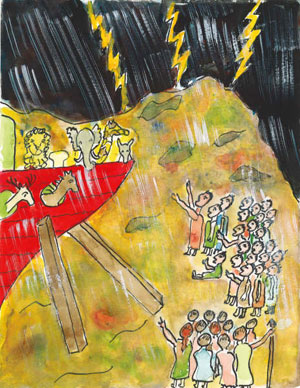Images of Jesus are such common currency in our popular culture that we scarcely notice them, save to afford them a sentimental smile or an eye-roll of aesthetic disdain. From rappers in crucifixion poses on their album covers, to kitsch statues for your little softball player, Jesus is like Mrs. Dash, tossed in to spice up the processed images served up to our jaded palates.
On the one hand, the Incarnation means that Jesus really is standing behind us in the batter’s box (though he didn’t help the Red Sox much this week). We mustn’t get so churchy that we wall off certain areas of life as too mundane for his attention. He still knows when we’re stealing from the cookie jar.
On the other hand, casual handling of Jesus’ image domesticates it, robbing it of its power, as least as often as Jesus-ification elevates the subject matter in question. For me, kitsch images of Jesus can clutter up my mind and block my ability to visualize him as a real, individual, living person.
Kittredge Cherry at Jesusinlove.org has compiled a book of contemporary GLBT and feminist Christian art entitled Art That Dares: Gay Jesus, Woman Christ and More. Samples can be viewed on the gallery page.
I wanted to recommend this project wholeheartedly, but my reaction to the sample works was more complicated. The artworks are presumably meant to be affirming to one group of viewers, and disturbing to others. Jesus, I think, should be experienced as both affirming and disturbing to everyone. Mainstream sentimental Christian art is hampered by its clear-cut message, a trait that this project doesn’t fully escape.
Should the goal of this work be conceived as political rather than devotional, it’s easier for me to overlook the lack of nuance in some of the pieces I saw. It was similarly scandalous to some white Western Christians when people of color tossed out the blonde, blue-eyed image of Jesus in favor of a more African appearance. In Christ there is neither Jew nor Greek, male nor female. Most people today would add “black nor white”, but “gay nor straight” (though arguably contained in “male nor female”) is a tougher sell. Paintings like Becki Jayne Harrelson’s The Crucifixion of Christ deliver a shock that can’t be ignored.
Christians who think Cherry’s project is scandalous should go back and read some classic Christian poems, with their ideological blinders off. Start with St. John of the Cross:
On a dark night,
Kindled in love with yearnings
–oh, happy chance!–
I went forth without being observed,
My house being now at rest.
In darkness and secure,
By the secret ladder, disguised
–oh, happy chance!–
In darkness and in concealment,
My house being now at rest.
In the happy night,
In secret, when none saw me,
Nor I beheld aught,
Without light or guide,
save that which burned in my heart.
This light guided me
More surely than the light of noonday
To the place where he
(well I knew who!) was awaiting me
— A place where none appeared.
Oh, night that guided me,
Oh, night more lovely than the dawn,
Oh, night that joined
Beloved with lover,
Lover transformed in the Beloved!
Upon my flowery breast,
Kept wholly for himself alone,
There he stayed sleeping,
and I caressed him,
And the fanning of the cedars made a breeze.
The breeze blew from the turret
As I parted his locks;
With his gentle hand
He wounded my neck
And caused all my senses to be suspended.
I remained, lost in oblivion;
My face I reclined on the Beloved.
All ceased and I abandoned myself,
Leaving my cares
forgotten among the lilies.
(translation courtesy of this website)
And how about this poem by the 17th-century metaphysical poet George Herbert:
Love bade me welcome, yet my soul drew back,
Guilty of dust and sin.
But quick-ey’d Love, observing me grow slack
From my first entrance in,
Drew nearer to me, sweetly questioning
If I lack’d anything.
“A guest,” I answer’d, “worthy to be here”;
Love said, “You shall be he.”
“I, the unkind, the ungrateful? ah my dear,
I cannot look on thee.”
Love took my hand and smiling did reply,
“Who made the eyes but I?”
“Truth, Lord, but I have marr’d them; let my shame
Go where it doth deserve.”
“And know you not,” says Love, “who bore the blame?”
“My dear, then I will serve.”
“You must sit down,” says Love, “and taste my meat.”
So I did sit and eat.
“Love”, in this poem, is another name for Christ. Who is male. From the first stanza, we can see that the speaker is obviously male too. Something to think about.



